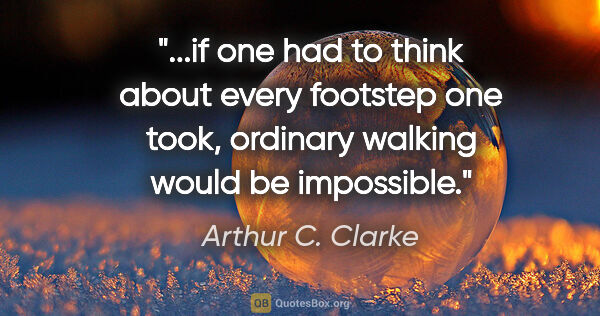Would Be Quotes (page 185)
He was beastly tired, but it was hard to stop. One more book, he had told himself, then I'll stop. One more folio, just one more. One more page, then I'll go up and rest and get a bite to eat. But there was always another page after that one, and another after that, and another book waiting underneath the pile. I'll just take a quick peek to see what this one is about, he'd think, and before he knew he would be halfway through it.
George R. R. Martin
Then as I was getting up to the Closerie des Lilas with the light on my old friend, the statue of Marshal Ney with his sword out and the shadows of the trees on the bronze, and he alone there and nobody behind him and what a fiasco he'd made of Waterloo, I thought that all generations were lost by something and always had been and always would be and I stopped at the Lilas to keep the statue company and drank a cold beer before going home to the flat over the sawmill.
Ernest Hemingway


Then the wooden benches along the walls, where so many outcasts had slept, would be lit by a sort of slow, clocked lightning til the bulb steadied and fastened its tiny feral fury upon the center of the room like a single sullen and manic eye. To burn on there with a steady hate. Til morning wearied and dimmed it away to nothing more than some sort of little old lost gray child of a district-station moon, all its hatred spent.
Nelson Algren
The snag in this business of falling in love, aged relative, is that the parties of the first part so often get mixed up with the wrong parties of the second part, robbed of their cooler judgement by the party of the second part's glamour. Put it like this: the male sex is divided into rabbits and non-rabbits and the female sex into dashers and dormice, and the trouble is that the male rabbit has a way of getting attracted by the female dasher (who would be fine for the non-rabbit) and...
P. G. Wodehouse
To represent a bad thing in its least offensive light is, doubtless, the most agreeable course for a writer of fiction to pursue; but is it the most honest, or the safest? Is it better to reveal the snares and pitfalls of like to the young and thoughtless traveller, or to cover them with branches and flowers? Oh, reader! if there were less of this delicate concealment of facts--this whispering "Peace, peace," when there is no peace, there would be less of sin and misery to the young of both...
Anne Bronte
